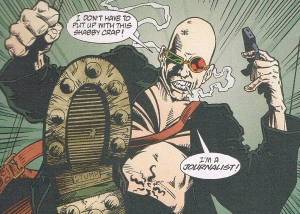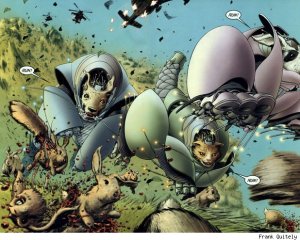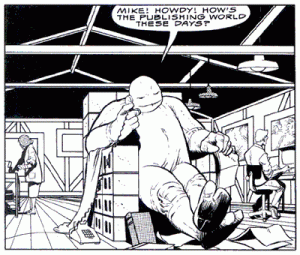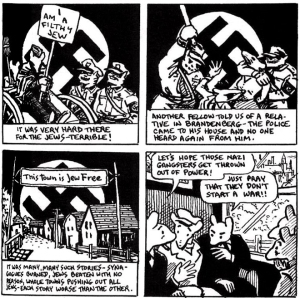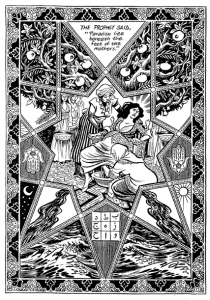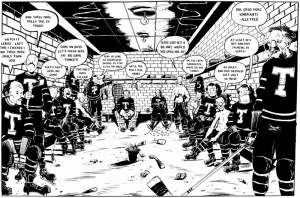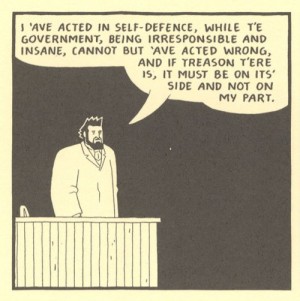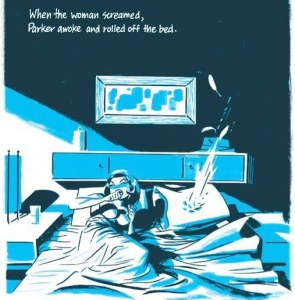At the beginning of the year, I said that 2015 would be my year to start blogging again, and that I’d be blogging every week. What I didn’t mention is that I’m using the Martian week, which really means once every 6 months.
Ok. Let’s try this again. We’re almost done.
30. Pluto by Naomi Urasawa (2003, Viz Media)
Just like people will say they don’t like jazz, but still have some Miles Davis in their collection, Urasawa is the manga creator of choice for white people that don’t like manga. Although I’ve liked all of the Urasawa that I’ve read, Pluto gets the nod for me for one simple reason: It’s the shortest. It’s still 8 volumes, which racks up to well over a thousand pages. But Urasawa’s other works like Monster and 20th Century Boys take 1000 pages just to introduce the main characters. A modern reimagining of Astro Boy, Pluto is that rare beast: A character driven epic.
29. Transmetropolitan by Warren Ellis & Darick Robertson (1997, Helix)
Transmet is pure, unadulteread Ellis, for better or for worse. Nowhere near as tightly plotted as other Ellis books like Planetary or Global Frequency, Transmetropolitan stars a slightly fictionalized version of Hunter S. Thompson, struggling to report on a transhumanist science fiction future that I hope never comes. Ellis & Robertson make a perfect team here, with each creator seeming to be the perfect incubator for the other’s ideas.
28. WE3 by Grant Morrison & Frank Quitely (2004, Vertigo)
I’ve said it before, and I’ll say it again: WE3 is the best comic that Grant Morrison has ever wrote. It’s not the best comic that Frank Quietly has ever drew, since every comic Frank Quitely draws is the best comic that Frank Quietly ever drew. And it’s no coincidence that both the best (WE3), and the second best (All-Star Superman) comics that Morrison has produced were both drawn by the same person. WE3 literally has everything: Action, Pathos, and Cybernetic Puppies.
27. Concrete by Paul Chadwick (1994, Dark Horse)
The premise behind Paul Chadwick’s little masterpiece is simple: A political speechwriter gets turned into a super powerful giant rock monster by alien beings. And now he has to deal with it. The elegant simplicity of the pitch is what makes it work so well. And Chadwick uses the sci-fi backdrop as a launching pad to tell pretty much any kind of morality tale he wants, as well as to use the character to warn us about things like over population, ruining the environment, and even just being a dick to each other.
26. Maus by Art Spiegelman (1980, Pantheon)
I’m pretty sure it’s against the law to do a list and NOT include Maus. To be fair, by this point it’s almost impossible to really gauge how good this comic is. It’s the Beatles of comics: So much was influenced by it, that’s it’s hard to remember comics without it. But what I can do, is remember what it was like for me to read it for the first time. And I remember that it absolutely blew my mind. I grew up in a German household where the effects of the Holocaust were more than a little downplayed (“It wasn’t nearly as bad as everyone says” was a phrase often quoted), so to see the other side of it, to see this side that showed the absolutely devastating human cost of the Holocaust, literally changed the way I thought about the 20th Century.
25. Habibi by Craig Thompson (2011, Pantheon)
There was more than a little controversy about this when it came out a few years ago. Charges of racism & sexism were plentiful when this came out, and it’s easy to see where they came from as the lead character is Arabic and seems to spend most of the 600 pages of this book getting raped by other Arabs. But Thompson’s job on this book wasn’t to create a realistic character. It was to draw and write a 600 page romantic adventure epic. And he did. Spectacularly. If you are looking for an example of just what comics can accomplish from a visual storytelling perspective, I can think of no better book than Habibi.
24. Essex County by Jeff Lemire (2008, Top Shelf)
Lemire has gone on to write a lot of shitty comic books for DC since he did Essex County, but when he writes & pencils his own material, there isn’t a creator more capable of tugging at your heartstrings than Jeff Lemire.
23. Louis Riel by Chester Brown (1999, Drawn & Quarterly)
I didn’t plan on putting Riel & Essex Country together, but it’s fitting considering that they are two of the greatest Canadian comic books ever made. Louis Riel is the story of Louis Riel, either the greatest hero, or the greatest villain, my country has ever known, depending on who your parents are and where you went to elementary school. Brown’s unflinching look at arguably the most interesting character in Canadian history is a must read for all Canadians, and all comic lovers.
22. Fun Home by Alison Bechdel (2006, Houghton Mifflin)
I think I can say with confidence that this is the only book on this list that has been turned into a Tony-Award winning musical (Keep trying, Grant Morrison!) But before it cleaned up at the Tonys, Fun Home was a heart wrenching look at one woman’s experience in coming out to her family, only to find out that her family’s secrets were buried far deeper than she could have ever guessed.
21. Richard Stark’s Parker by Darwyn Cooke (2009, IDW)
A fairly high ranking for an adaptation, but I can read these over and over and never get tired of them. That automatically jumps them pretty high in my book. Cooke’s design-heavy, cinematic art style is the perfect choice to adapt Donald Westlake’s perfect little crime stories, and I’m hoping he continues to go back to that well for years to come.

